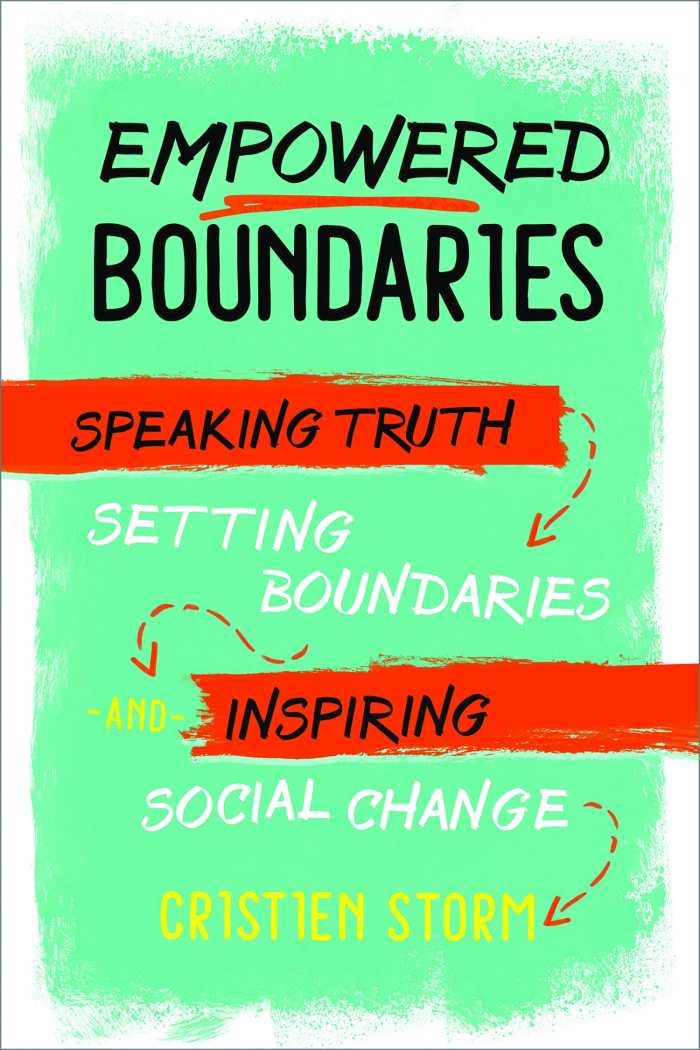Book of the Day Roundup September 17 - 21

Empowered Boundaries
Speaking Truth, Setting Boundaries, and Inspiring Social Change

Cristien Storm
North Atlantic Books
Softcover $15.95 (208pp)
978-1-62317-274-9
Buy: Local Bookstore (Bookshop)
When does “no” really mean no? The fact that we are still debating this question shows just how much we really need Cristien Storm’s Empowered Boundaries. Today, there’s even backlash against increased protections for vulnerable populations, not to mention an upsurge in white nationalism and white supremacist groups. Increased violence against women, the LGBTQ community, immigrants, and people of color are evident; social safety nets designed to protect the sick, the disabled, the poor, and children are in danger. Storm’s book shows how essential setting boundaries is to standing against violence, creating safe spaces, and building stronger families, communities, and nations.
Storm honed her boundary-setting skills as a young adult involved in the San Francisco Bay Area’s punk rock music communities, kicking out invading organized Nazi groups. She now is a mental health therapist, cofounder and former executive director of Home Alive, and cofounder of If You Don’t They Will, a Seattle-based partnership that provides training related to dealing with hate groups and white nationalism.
Not just theoretical but practical and useful for individuals and groups, the book provides exercises in boundary-setting skills and clarifies why individuals and groups have a right and a responsibility to set them. It explains the “messy and complicated process” of establishing different kinds of boundaries and distinguishes between people’s opinions, to which they have a right, and dangerous, hate-filled ideologies against which strong, empowered boundaries must be erected.
Whether or not we want them to be, our boundaries are not just personal but social and political, shaping communities by expressing what is allowed to exist within them. Those who set empowered boundaries comprehend that for our “yes” to be valid, our “no” must be equally so, and that there is power in each.
KRISTINE MORRIS (August 14, 2018)
Laurentian Divide

Sarah Stonich
University of Minnesota Press
Hardcover $22.95 (272pp)
978-1-5179-0562-0
Sarah Stonich’s Laurentian Divide continues the story of northern Minnesota’s Hatchet Inlet, a vacation town whose residents are deeply rooted in a place dependent on transience. Poised on winter’s trailing edge, everyone waits for Rauri Paar’s return, for when he navigates his way into town from his remote island, he heralds the spring thaw. When the ice melts and Rauri doesn’t come, the search for him knocks loose an emotional lost-and-found, with the meltwaters of the town’s past flooding the present and propelling everyone toward a changed future.
The traditions of Hatchet Inlet’s populace aren’t partisan or anachronistic in the way that urban-rural divisions are often portrayed. “You will not find climate-change deniers in Hatchet Inlet, where extremes are felt and seen daily;” neither will you find a homogeneous block of ideologies behind the scrim of shared heritage. The residents wryly watch the world flock to fashion trends and social capital; they know how to make a buck, running their businesses with tourists in mind without ever selling themselves.
Thanks to Stonich’s keen depictions, this is a small town peopled with actual people: diverse individuals united by a common experience of place. An alcoholic veterinarian struggling post-divorce, a retired schoolteacher turned bold and brassy in her dementia, a famous artist retrenching her family’s rundown resort, a widower falling for a waitress, a Vietnam veteran who crafts antler chandeliers, and many others—they are the ones found in the corners of America’s middle, or any place with little room to hide differences.
Stonich knows that everybody comes from somewhere, and when that somewhere is rural, there’s a whorled particularity to the story. Laurentian Divide transports attention to a “scrap of near-nowhere” because “life isn’t something that happens to you—how you choose to react to what happens is life.”
LETITIA MONTGOMERY-RODGERS (August 5, 2018)
Madame Victoria

Catherine Leroux
Lazer Lederhendler, translator
Biblioasis
Softcover $14.95 (240pp)
978-1-77196-207-0
Buy: Local Bookstore (Bookshop)
Madame Victoria is an imaginative, haunting, and insightful examination of the lives of women.
Shortly after the millennium, a skeleton is discovered on the grounds of Montreal’s Royal Victoria Hospital. It is identified as having belonged to a woman fiftyish, Caucasian, and who died nonviolently. The unclaimed skeleton is dubbed Madame Victoria. A series of vignettes follows, conjuring Victoria in a variety imagined lives.
The earliest chapters of the book are its most literal. As an unwed mother who slips into permanent psychosis after her infant dies, an acerbic and very alcoholic newswoman who smashes the glass ceiling, and a foster-home teen who reneges on a suicide pact, Victoria is achingly real and believable.
As Victoria’s stories continue to unspool, they drift farther from reality, taking shape as metaphors or merging reality with elements of horror and science fiction. The tale of a runaway Mormon wife beset by too many children reaches new heights of honesty, capturing moments of maternal disgust before demonic children take their revenge.
A chapter that transforms Victoria into a nineteenth-century slave impedes the delicate time frame that holds the stories together; a tale that thrusts Victoria into the male body of a cross-dressing spy is too gimmicky to be impactful. The book bounces back to life with a piece that makes Victoria a twenty-fifth-century megacelebrity who emerges in present-day Montreal, only to live her life as a bag lady.
Plausible realities deftly portray the interior lives and unspoken tragedies of ordinary women. Succinct, piercing insights are scattered along the trails of each story; they are a pleasure. A fine translation by Lazer Lederhendler preserves the distinct flavor of the book’s Canadian French.
Absorbing and often poignant, Madame Victoria is an achievement, both as a mystery about the missing identity of one woman and in its portrayal of women’s lives more broadly.
SUSAN WAGGONER (August 27, 2018)
A Boy and a House

Maja Kastelic
Annick Press
Softcover $9.95 (32pp)
978-1-77321-054-4
Buy: Local Bookstore (Bookshop)
An inquisitive boy follows a trail of paper clues into a shadowy building in a wordless early-morning adventure full of friendship, surprises, and the dawning of a new day. Beautifully layered watercolor paintings capture the mystery and nostalgia of Eastern European streets and rooftops. Hidden gems abound in the details as a curious cat and playful mice lead the way. Light and shadow surround the boy as he moves bravely forward with wonder.
PALLAS GATES MCCORQUODALE (August 27, 2018)
Quite Mad
An American Pharma Memoir

Sarah Fawn Montgomery
Mad Creek Books
Softcover $23.95 (296pp)
978-0-8142-5486-8
Buy: Local Bookstore (Bookshop)
Quite Mad, Sarah Fawn Montgomery’s mental illness memoir, is nothing short of mesmerizing—an ode to her years of struggling with anxiety, OCD, and PTSD, all of which she eventually accepted as a core part of her being.
The book chronicles Montgomery’s lifelong battle with crippling anxiety, itself responsible for a litany of symptoms and difficulties. After years of navigating various medications and their horrible side effects, including hair loss and depression, Montgomery finally found a regimen that helps her function.
The book maintains an indictment, of sorts, of the American pharmaceutical industry, as well as an exploration of the gender-biased ways in which people talk about mental illness. It also includes a fascinating history of America’s responses to mental illness, from the earliest psychotropic drug to lobotomies to the “rest cure.”
Straightforward and unapologetic, Montgomery recalls her dysfunctional upbringing. Her parents adopted many special needs children, and had no time for their biological children; when she was diagnosed with anxiety, her father did not believe it. She also had to grapple with trauma from violence.
Later, Montgomery’s incredibly supportive husband also struggled with mental health. She was repeatedly rebuffed by doctors, who, she says, tend to overprescribe medications. She lays bare misconceptions about mental illness, and unearths the pharmaceutical industry’s tendency to underreport harmful side effects.
Nevertheless, the book contains quiet triumphs and self-discovery, shining with unyielding grace and humor. Montgomery’s writing is eloquent, making no attempt to mask her pain. She cites medical studies but also keeps things personal; the result is a stellar work of literary journalism.
HILARY DANINHIRSCH (August 5, 2018)
Foreword Reviews
